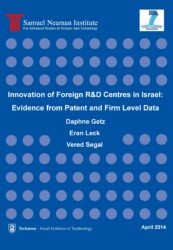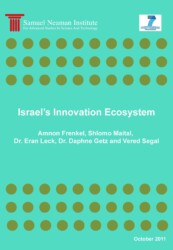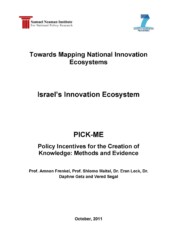The project is implemented under the Seventh Program of the European Union (FP7), a consortium that consists of seven countries (Italy, Germany, France, Spain, Poland, the UK, and Israel). The purpose of the project is to examine empirically the role of the demand side in the creation of technological knowledge, recognition of technological and organizational innovation, and encouraging the increase in productivity. The project is formally complete and our contribution was expressed in five outputs.
In 2014, two reports that are part of the project were published. One involved applying a methodology developed by Frenkel that allows visual mapping of an ecosystem of national innovation, in which the ecosystem of technological innovation in Israel, Spain, Germany, France, and Netherlands was mapped. Not as part of the project, the implementation of the methodology was expanded to map the ecosystem of healthcare innovation in Ontario, Canada, in the high-tech industrial park in Shanghai, and in Singapore. The methodology and the results obtained from the analysis of the findings in these areas are presented in a book recently published by Edward Elgar Publishing in the UK. In addition to publishing the book, Frenkel was invited to apply this methodology in the State of Ceará in northeastern Brazil by the President of the Industrial Association in that country, and Frenkel and Maital have most recently applied it also in San Paulo, Brazil. The second report constituted an analysis of data collected during a field survey of the ecosystem created by the Rad Binat Group in Israel, which yielded about 130 companies. The study found that social and technological proximity encourages the tendency of companies to maintain business relationships, which probably contributes to knowledge exchange.
* Work Package 5, which evaluated demand and the evolution of stores of knowledge in sectors and regions that are knowledge-intensive.
* Work Package 6: “Adapting the demand for training knowledge workers in local labor markets“.
* Work Package 7: Development of demand, sectoral development and the organization of innovation activities.
The Pick-Me project began in January 2011 and scheduled to be completed in October 2014.




